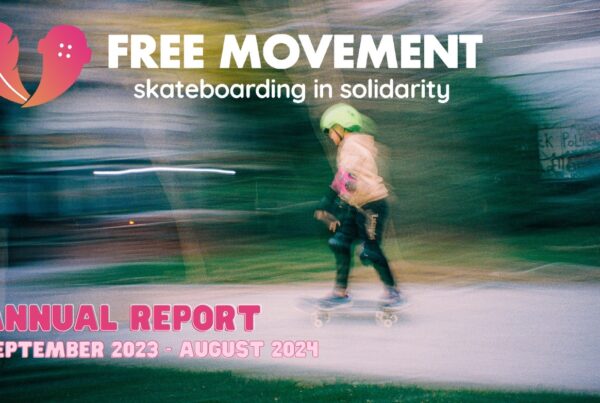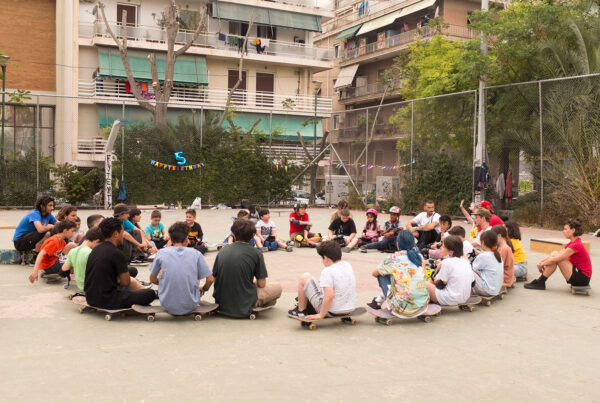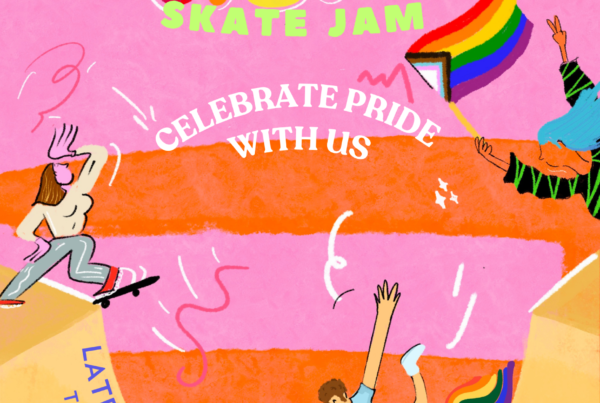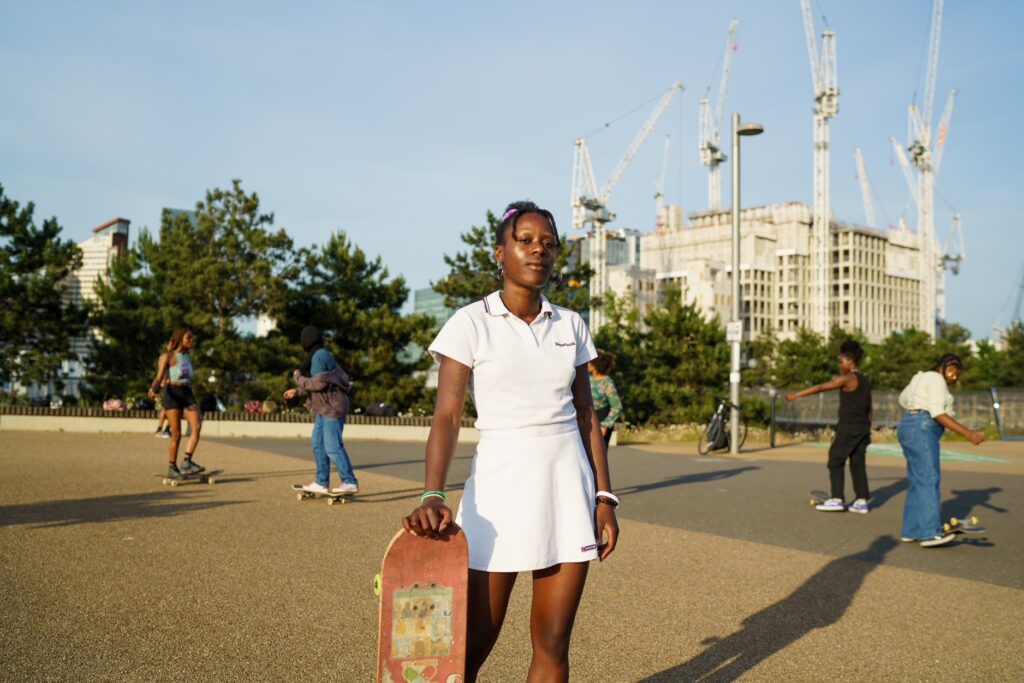
Ruby catches up with Marie Mayassi, a former FMS volunteer who runs Melanin Skate Gals & Pals, a BIPOC & queer skate crew which centres on empowerment, community engagement and social action.
R: Hey Marie! It’s been a while since we last saw each other, and it seems the whole world has shifted in that time. When was it that you visited Athens to volunteer for FMS?
M: Hey Ruby! Hope you are well 🙂 I am doing good – it has been a long time! The world has changed so much and I believe I have too. I visited Free Movement skateboarding in July 2019, it feels like a lifetime ago!
R: Wow, two years ago already! Well it was a pleasure to have you and it’s been great hearing about your new project, Melanin Skate Gals & Pals. Can you tell me a bit about it?
M: I know! It’s been so long! Really missing Greece! Melanin Skate Gals & Pals is a collective of skaters with the aim to empower marginalised communities as well as amplifying their voices. We are working through a fair representation of BIPOC within the skate world, providing wellbeing benefits of skating and a safe space.
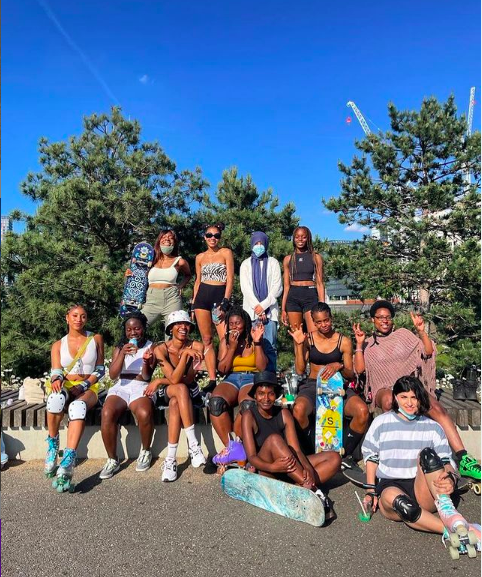
R: Yes there is certainly much work to be done in terms of fair representation for BIPOC folk in the skateboarding world, and this should be a priority for everybody. It was great to see the recent campaign launched by the Goodpush Alliance, ‘Pushing Against Racism’, a commitment from organisations and individuals all across skateboarding who seek to create an anti-racist culture in the skate community worldwide.
In general, this recent wave of groups and organisations pushing for skateboarding to be led in a more inclusive and welcoming direction was much needed, and the more people who join the movement the better. To enable anyone who wants to take up skateboarding to look at the existing community and see themselves already reflected there.
Before COVID, when FMS were running our International Volunteer Program, we had people applying from all corners of the globe – with roughly equal applications gender-wise. However, the applications from BIPOC folk were drastically low – perhaps just 1 out of 30. We realised at this point that we had to do extra outreach to marginalised communities. As in most cases, you can’t expect people to feel welcomed if the representation is not already there. It is not that there aren’t many BIPOC skaters out there, it is that opportunities across the board are dished out in unequal measures.
Is this something that Melanin Skate Gals & Pals is addressing, and what can we – as skaters, allies and workers/volunteers within social skateboarding projects – all do to work towards equity?
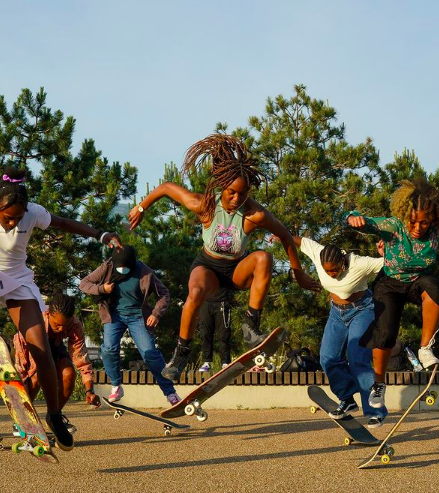
“Many organisations do not seem to understand that by having more non-white people as part of management teams will give them a better understanding of how to cater for the needs of marginalised people.”
Marie Mayassi
M: Yes I totally agree with everything that you’ve said. It is an issue of representation and who is made to feel welcome within the community. When participating in FMS’ and SkatePal’s volunteer programs it was very clear to me that a gap needed to be filled in terms of the amount of BIPOC folks present on site. I also quickly realised how my presence was impacting beneficiaries of both programs. You cannot be what you cannot see and I could see that children in Athens felt seen having me around. On the other hand, I was saddened by how surprised they were that I made it there? I believe this was heavily influenced by the lack of representation within volunteer programs.
White saviourism is a huge issue within the volunteering world, and just perpetuates the idea that white people are there to save underprivileged communities. Many beneficiaries don’t see that this is a result of white privilege rather than who is introduced and gets to enter volunteering spaces. Which are extremely white washed. And skateboarding is not exempt from this.
I think humanitarian skateboarding organisations need to make sure they’ve got BIPOC people as part of their decision making teams. It is good to want more non-white volunteers but how will they be accommodated? What is the purpose and intent? Appearing more diverse and inclusive, or actually integrating the views of members of the BIPOC community into your program? Many organisations do not seem to understand that by having more non-white people as part of management teams will give them a better understanding of how to cater for the needs of marginalised people.
I think BIPOC folks are not looking to tell white led organisations how to be more inclusive anymore but are wanting to be part of decision making processes. For example, how many BIPOC volunteers have you had since the beginning of FMS? And how many paid members have you hired since the beginning? Taking in consideration that the majority of your beneficiaries are non white; this should be something you have monitored or should start to monitor.
To tackle this, in the future Skate Gals & Pals wish to partner with worldwide humanitarian skate organisations to secure some spaces for members of our collective, whom will be sponsored to participate in humanitarian skate programs. However, we want to make sure that organisations have clear measures to welcome BIPOC volunteers.
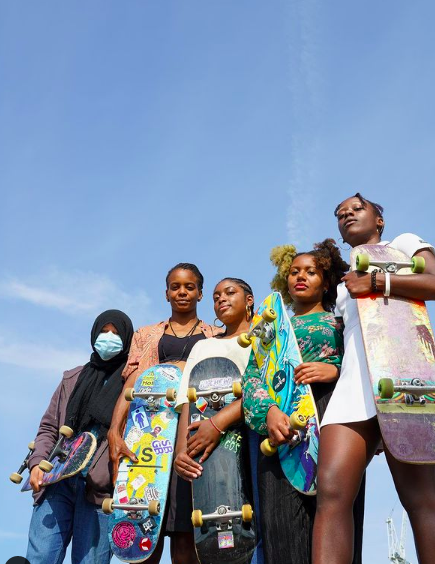
R: Exactly, most of the kids involved in our workshops are too young to know about structural oppression and systemic racism. So they are unaware of the reasons why marginalised communities are less likely to apply for positions within social skateboarding projects – be it as a volunteer, staff member, or part of the management team. They just observe their here and now – seeing the people teaching in the workshops and must wonder why they don’t see themselves reflected there.
As you mentioned, it is not only an issue of representation on the ground in the workshops. Social skateboarding projects would benefit from the diversity of governance within their management teams, general staff and Boards of trustees – ensuring that a variety of voices and perspectives are heard in all aspects of the organisation.
For FMS, the priority was always to transition to a locally-led team once we’d found our feet. This includes people from displaced communities who are settled in Athens. Now, apart from co-founder Will, our team is entirely local. We plan to enrol more of our teenage participants into our youth leadership programmes once we can begin our full operations again, with the aim that they will then form part of the team of staff when they can and perhaps even go on to join the management team in the future.
Although FMS doesn’t plan to relaunch their International Volunteer Program, we would really love to stay connected and work together to ensure we’re doing the best we can to make positive changes from within. Like you suggest, perhaps we could begin with a survey for social skateboarding projects to complete – so that we can see what the demographic is now (in terms of BIPOC folks within volunteer programs and staffing teams) and how it develops once more people and organisations commit to progressing towards more inclusive practices.
The sponsorship programme for BIPOC volunteers is a great idea and a really tangible project which would hopefully pick up funding easily. A previous member of our team, Amber, was also working towards this for the relaunch of our International Volunteer Program. Alas, COVID…
One last thing and I will let you go! – for those who want to join your sessions or hear more about your collective, where can they find that information?
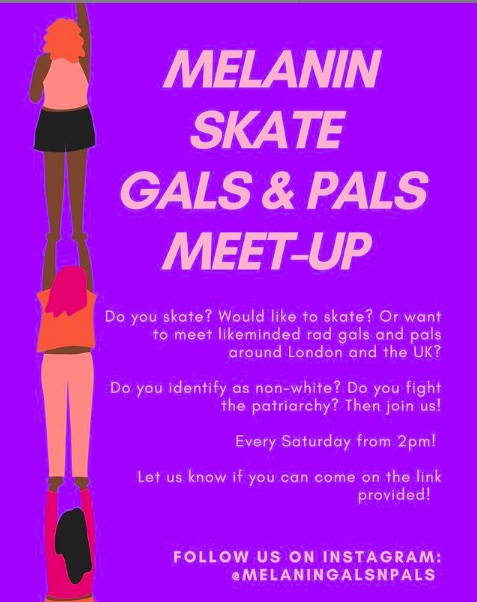
M: Indeed representation is all and I cannot stress this enough. About FMS, that sounds great! I believe social skateboarding projects around the world need to be managed and led by local populations! And create opportunities for the beneficiaries who can then learn skills with the same organisation they’ve benefited from! I want to do the same with Skate Gals & Pals, create a space where people can come and learn different skills such as screen printing, boards making, Zine making, skate coaching experience and through our volunteer programme give folks valuable admin experience by playing an active role in running the collective. This is to enable folks to find work in another organisation or create their own thing.
I am extremely warmed by how the skate community is evolving and the opportunities we have to uplift marginalised communities through skating.
I encourage everyone to follow us on Instagram @melaningalsnpals and @skategalsnpals! If you’re a member of the BIPOC community then come skate with us on Saturdays in East London! We will have more upcoming events in the next few months so keep in touch via social media! Finally, if you’d like to participate virtually we often host twitch live so join us then! https://www.twitch.tv/skategalsnpals/
I’m panellist at the Good Push summit on the 23rd of September discussing the topic ‘The Future of Social Skateboarding‘ at 6:00pm (CET), register now and don’t miss out!
Looking forward to speaking/skating soon Ruby!




